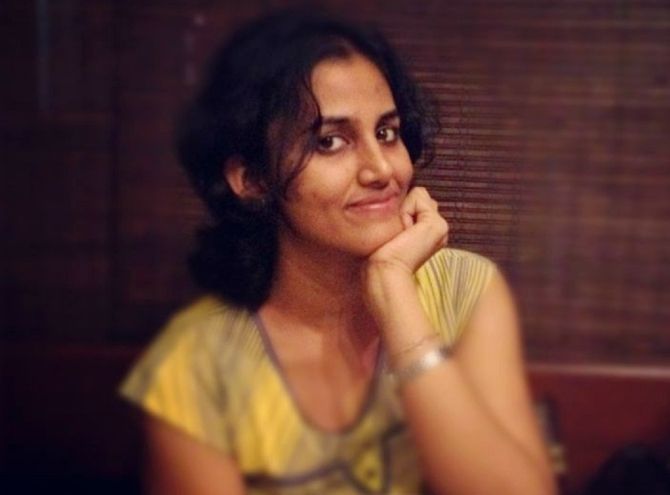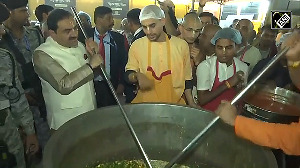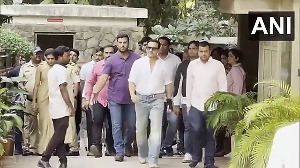Sneha Bhattacharjee narrates the story of Kirthi Jayakumar.

Photograph: Courtesy redelephantfoundation.org
On a night in May 2016, Kirthi Jayakumar received 16 messages and 31 calls from a friend based in the United Kingdom. She had got married and settled there only a year ago. The friend was a victim of extreme domestic violence.
From observing her habits within the house to monitoring how long she spoke on the phone with her family in India, the husband ensured there was no freedom for her.
While the woman managed to flee from the house one day when her husband was away, the incident shook Jayakumar.
"I felt guilty for not being able to help her when she had called," says the 30-year-old.
Jayakumar wondered how traumatic it would be for such victims of violence to have no one to reach out to or no knowledge of how and where to report the matter.
These questions, and the sense of responsibility she felt, led to "Saahas" (which means courage) -- an app and chatbot that comprises a directory of over 40,000 organisations across 196 countries offering medical, legal, resource (food, shelter, clothing, emergency support), consular and refugee-specific support for victims of gender-based violence, among other things.
More than a directory, Saahas is a live map where one can find help by zooming into a country to find the closest support organisation.
It took Jayakumar's team at Red Elephant Foundation (REF), an NGO, and members of the United Nations Volunteers programme two months to create the app.
Jayakumar, who is based in Chennai, personally verified each and every organisation before including it in the database: from enquiring through calls to checking their social media pages and looking for references or testimonials.
They realised their efforts were paying off when a girl of Sri Lankan origin living in Australia followed their website and ensured the rescue of her sister -- a victim of domestic violence -- who was married and settled in Germany.
This was right after they had launched the web app.
"Saahas," says Jayakumar, "was initially developed as a web app but I soon realised this would limit its accessibility for those women who don't have access to a computer."
So she decided to launch a mobile app as well.
Writer, doodler, activist and entrepreneur, Jayakumar says having herself been a victim of gender-based violence -- from high-school bullying to child sexual abuse -- she felt she needed to do something to help.
At 25, she founded REF, a civilian peacebuilding initiative that works for gender equality through storytelling, advocacy and digital interventions.
She also runs fynePRINT, a feminist e-publishing imprint.
A student of law, Jayakumar's last tryst with anything to do with computer science and coding was in Class X. Her computer teacher had effectively told her what could best be translated and understood as "This is not your ballgame," she says.
But that didn't deter her from learning coding all by herself, through Coursera that offers online courses, to build the app for victims of gender violence.
The app, while helping survivors to stand up to violence, also encourages bystanders to intervene when they witness the violence being committed by providing detailed instructions of what they can do to help.
"Saahas forces people [in a good way] out of their shells to become active bystanders," she says, recalling the Nirbhaya gang rape incident in Delhi in 2012. "That girl could perhaps have been saved had a bystander showed some courage to get help."
She adds, "We are so inert as a people; we turn away when faced with a tough situation. The idea of bystanders needs to change."
According to UN Women, 120 million girls worldwide have experienced forced intercourse or forced sexual acts at some point in their lives.
Thirty per cent of women who have been in a relationship have experienced some form of physical or/and sexual violence by their intimate partner, according to the World Health Organisation.
Less than 40 per cent of the women who experience violence seek help of any sort, states the UN Economic and Social Affairs.
Not many even try to report the case by seeking police intervention or calling any institution for help.
Jayakumar's work has won her laurels.
In 2016, she was invited to Michelle Obama's United State of Women Summit at the White House in Washington DC as a nominated change-maker.
"It was heartbreaking for me as my visa didn't come on time and I could not make it to the event," she says.
Then in 2017, she was one of the youth activists invited to attend then US President Barack Obama's Town Hall at New Delhi. "It was an incredible experience listening to him speak. As a leader, he symbolised hope for many. I've admired his leadership and what he came to represent," she says.
As a peace-building activist, Jayakumar has been a speaker at TEDx Chennai and was one of the youngest speakers at FICCI Ladies Organisation.
In 2012, she was the recipient of the US Presidential Services Medal for her work as a volunteer to Delta Women, a non-profit organisation.
Jayakumar has eight books to her name, of which the most recent one, The Doodler of Dimashq, tells the story of the Syrian civil war through the eyes of a child bride as she navigates life in a conflict zone.
In 2017, she launched an online social campaign as part of REF called "Femcyclopedia". This is like an encyclopedia of women in history around the globe. Combining Zen-doodling and research narratives, Jayakumar has tried to put these women back in the narrative.
"Contributions of women have been ignored, overwritten or even completely distorted in accounts of history, and that has kept the constant devaluation of women alive," she says. "I want to be able to curate a space for more and more young people to find more and more amazing women to learn from."
One such woman, she says, is Anne Frank.
One of Frank's quotes that she says always inspires her is, "I still believe, in spite of everything, that people are truly good at heart."
Jayakumar's play, Frankly Speaking, which she wrote in 2016 and performed on Frank's birthday, June 12, is a tribute to this young girl who is one of the most discussed Jewish victims of the Holocaust.
The play takes off from where Frank's diary ends -- and tells the stories of nine women from nine different genocides across time and geography, through poetic verse.












 © 2025
© 2025